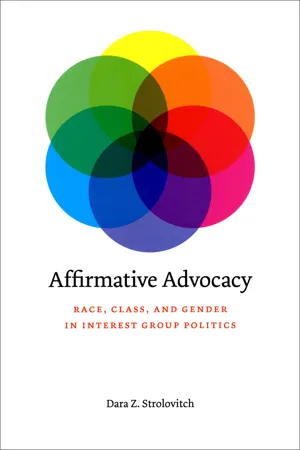
Affirmative Advocacy
Race, Class, and Gender in Interest Group Politics
- English
- PDF
- Available on iOS & Android
About this book
The United States boasts scores of organizations that offer crucial representation for groups that are marginalized in national politics, from women to racial minorities to the poor. Here, in the first systematic study of these organizations, Dara Z. Strolovitch explores the challenges and opportunities they face in the new millennium, as waning legal discrimination coincides with increasing political and economic inequalities within the populations they represent.
Drawing on rich new data from a survey of 286 organizations and interviews with forty officials, Strolovitch finds that groups too often prioritize the interests of their most advantaged members: male rather than female racial minorities, for example, or affluent rather than poor women. But Strolovitch also finds that many organizations try to remedy this inequity, and she concludes by distilling their best practices into a set of principles that she calls affirmative advocacy—a form of representation that aims to overcome the entrenched but often subtle biases against people at the intersection of more than one marginalized group. Intelligently combining political theory with sophisticated empirical methods, Affirmative Advocacy will be required reading for students and scholars of American politics.
Frequently asked questions
- Essential is ideal for learners and professionals who enjoy exploring a wide range of subjects. Access the Essential Library with 800,000+ trusted titles and best-sellers across business, personal growth, and the humanities. Includes unlimited reading time and Standard Read Aloud voice.
- Complete: Perfect for advanced learners and researchers needing full, unrestricted access. Unlock 1.4M+ books across hundreds of subjects, including academic and specialized titles. The Complete Plan also includes advanced features like Premium Read Aloud and Research Assistant.
Please note we cannot support devices running on iOS 13 and Android 7 or earlier. Learn more about using the app.
Information

Table of contents
- Contents
- List of Illustrations
- List of Abbreviations and Acronyms
- List of Cases
- Acknowledgments
- 1 · Introduction
- 2 · Closer to a Pluralist Heaven?
- 3 · Intersectionality and Representation
- 4 · Trickle-Down Representation?
- 5 · Tyranny of the Minority? Institutional Targets and Advocacy Strategies
- 6 · Coalition and Collaboration among Advocacy Organizations
- 7 · Conclusion: Affirmative Advocacy
- Appendix A · Study Design: Methodology and Data Collection
- Appendix B · Survey Questionnaire
- Appendix C · Interview Protocol
- Notes
- Bibliography
- Index